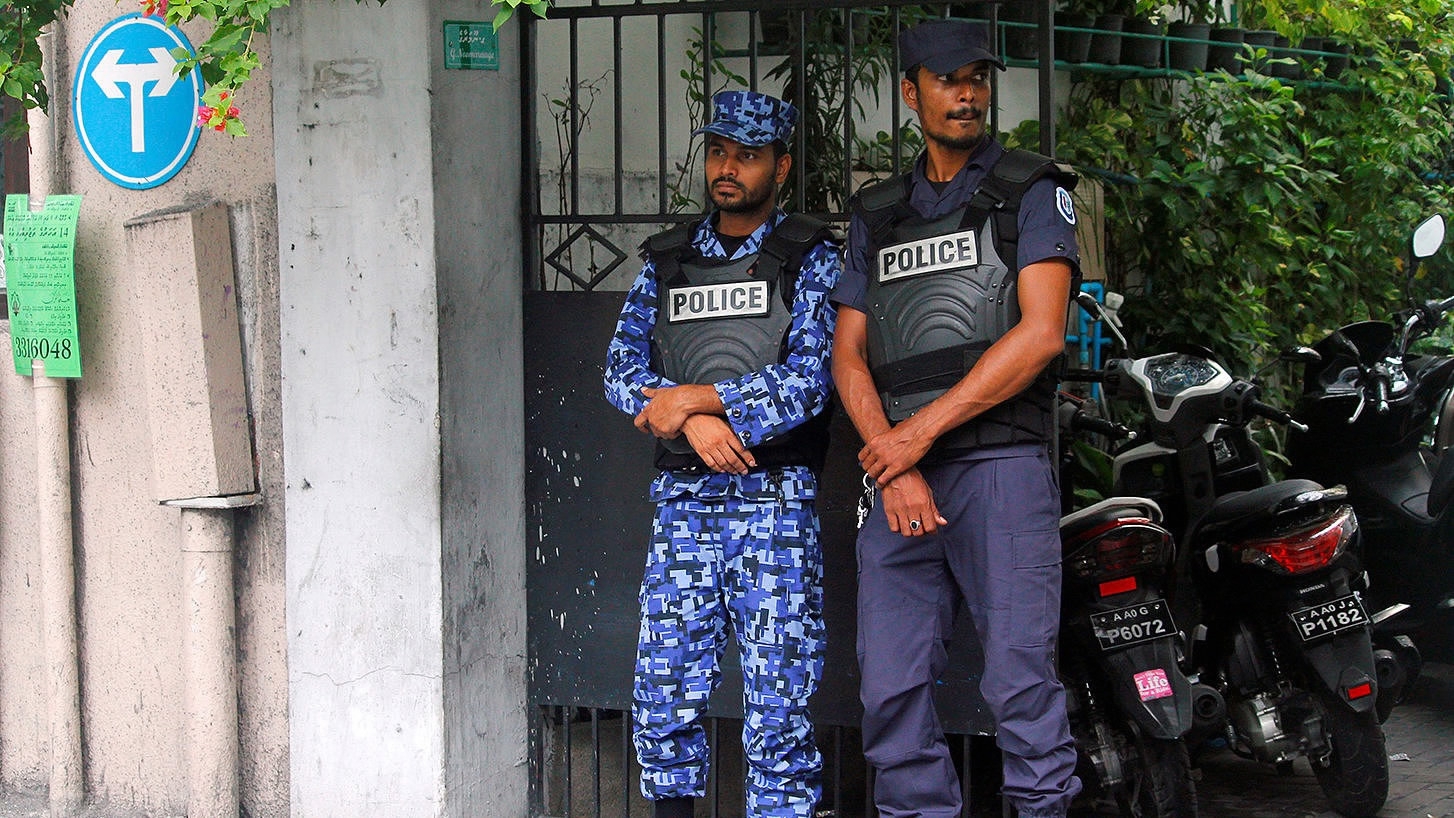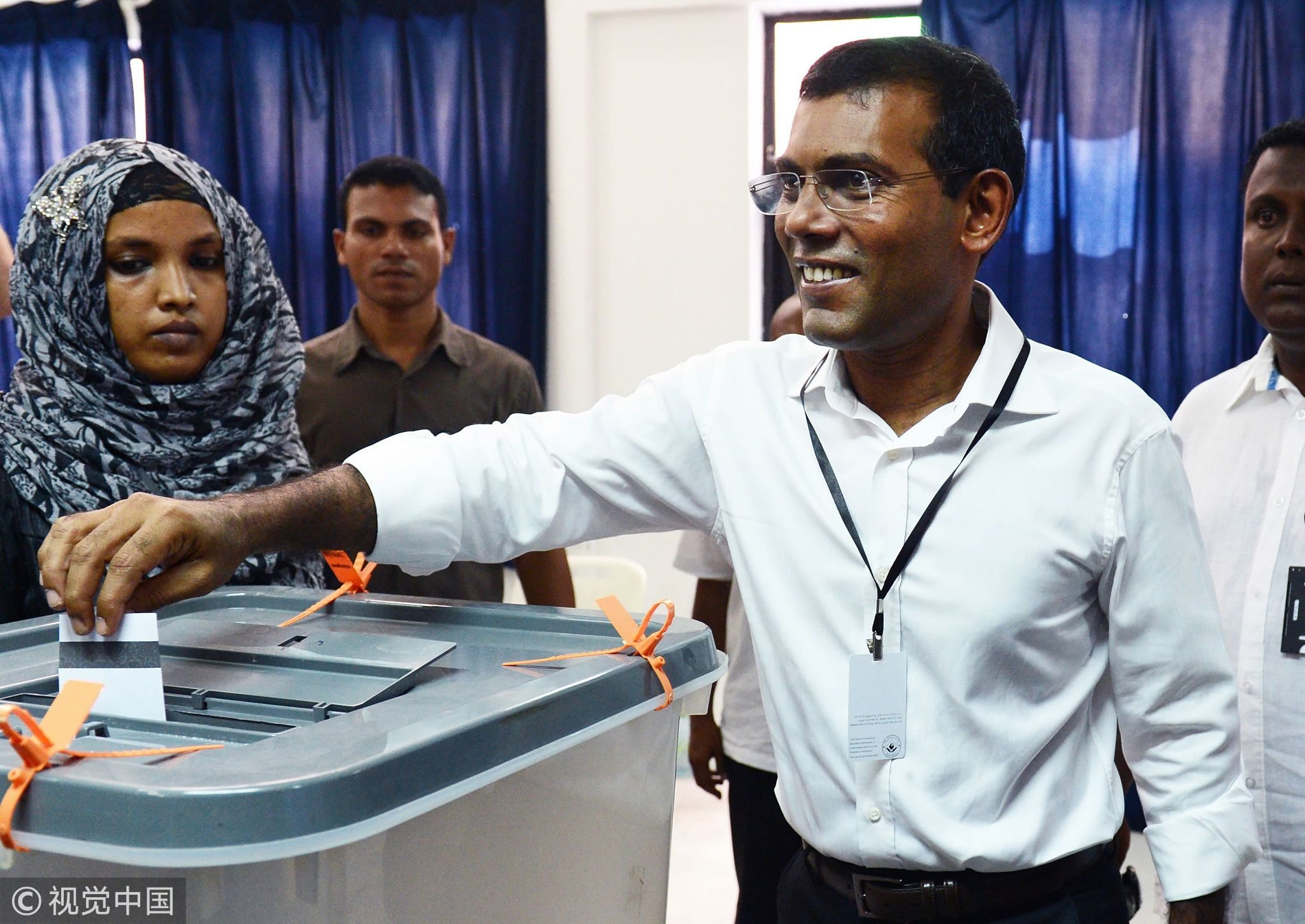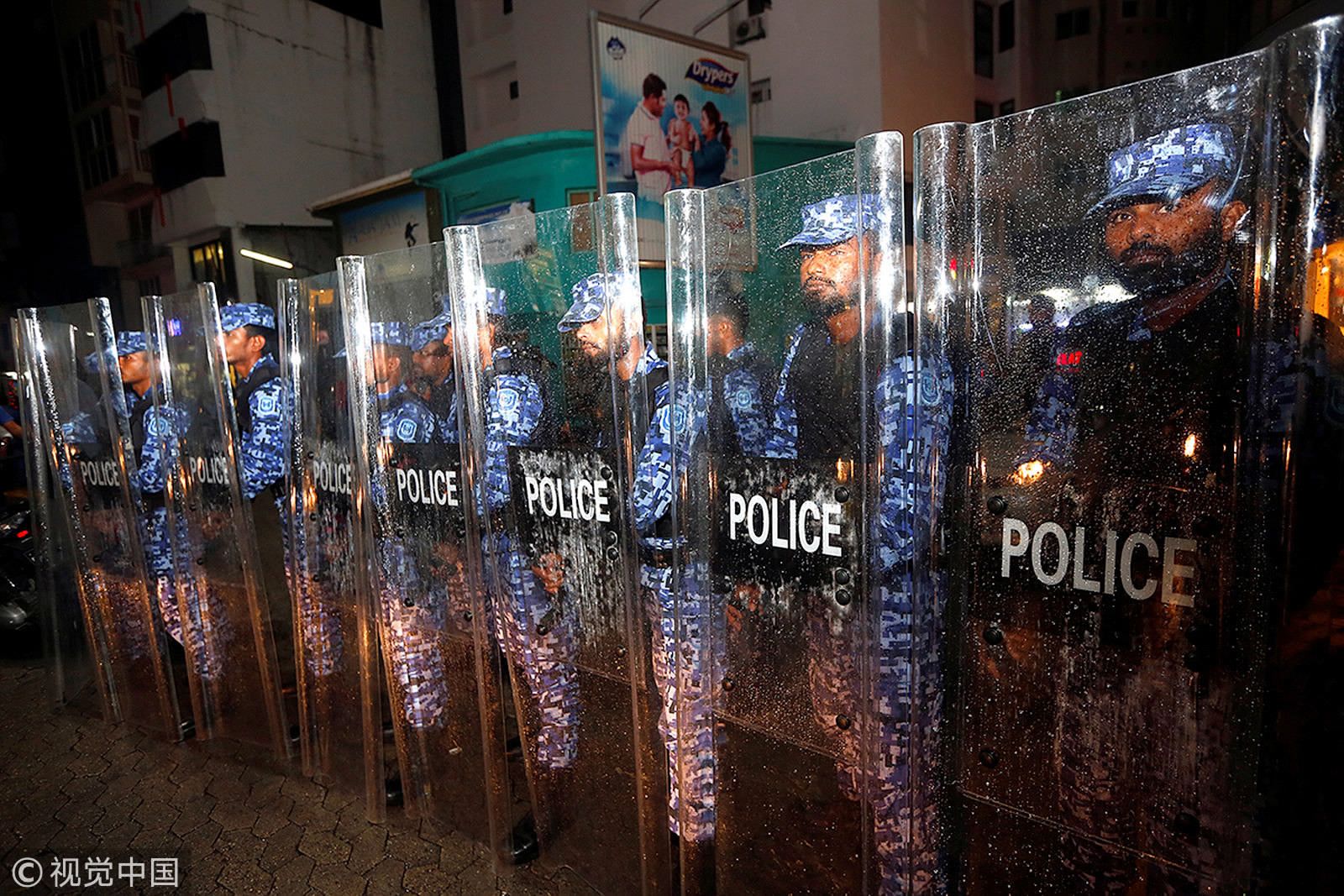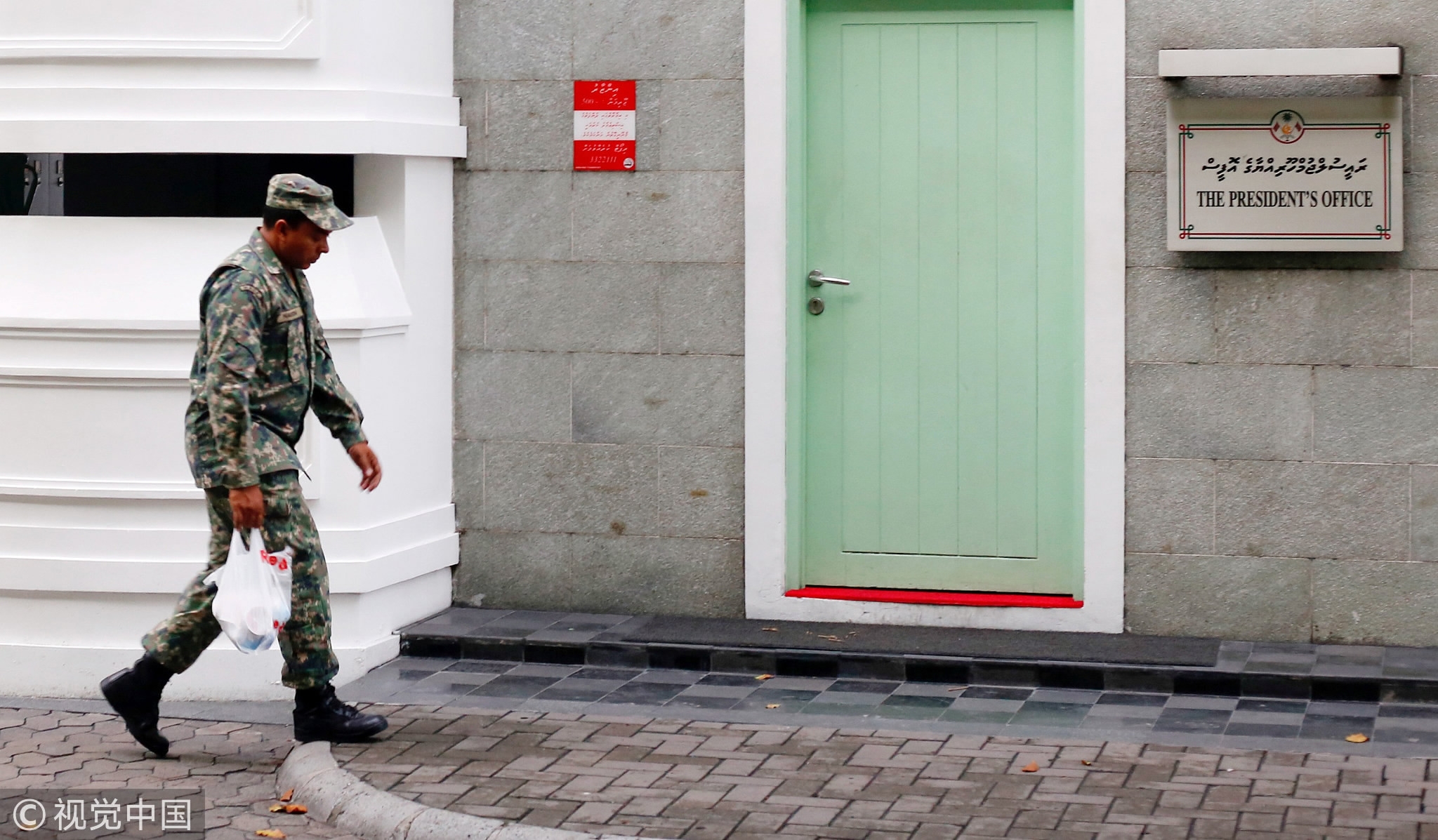
Opinions
21:45, 07-Feb-2018
Opinion: Why the Maldives riot matters to India
Guest Commentary by Zhou Rong

Maldives, a tiny nation with a population of roughly 400,000 people, was plunged into chaos on Feb. 1 when the Supreme Court ordered several jailed politicians to be freed – something the current president did not agree with. The government refused to implement the ruling, prompting a wave of protests and clashes between police and demonstrators in the capital, Male. The capital was thrown into turmoil on Feb. 5 when the president issued a 15-day emergency decree. Later that night, soldiers forced their way into the Supreme Court building and police officers arrested former president Maumoon Abdul Gayoom at his home.
Gayoom, half-brother of current Maldives President Abdulla Yameen, ruled the island nation for 30 years until 2008, but is now a vocal critic of the current president. The current government made clear that it would not respect the Supreme Court’s decision. And the decree gives the government sweeping power to make arrests, search and seize property, and restrict freedom of assembly. Soldiers in riot gear have also been preventing lawmakers from meeting in the parliament building. The clashes lasted about three hours, and police dispersed stone-throwing crowds using pepper spray and batons. Yameen has maintained a tight grip on power, controlling institutions such as the judiciary, police and the bureaucracy.

Maldivian former president and presidential candidate Mohamed Nasheed smiles as he casts his vote at a local polling station in Male. /VCG Photo
Maldivian former president and presidential candidate Mohamed Nasheed smiles as he casts his vote at a local polling station in Male. /VCG Photo
If the situation continues, as far as I am concerned, President Yameen will run for re-election virtually unopposed, with all of his opponents either jailed or exiled. However, former president Mohamed Nasheed, who was among those freed, said he would be a candidate. This latest unholy alliance is between two former presidents, Maumoon Abdul Gayoom and a man who once overthrew Gayoom, Mohamed Nasheed. The pair have been sworn enemies. If Yameen compromises, it will make the two former presidents and their groups more confident in their chances to jointly defeat the incumbent in the coming election.
Moving forward, security is a major concern. Many countries have issued a travel warning for the Maldives, urging residents visiting the popular tourist destination to exercise a high degree of caution.
What will India do as the biggest neighbor and the most influential power in the Indian Ocean?

Maldivian police stand guard on a main street during a protest by opposition supporters against the government's delay in releasing their jailed leaders in Male, Maldives on February 5, 2018. /VCG Photo
Maldivian police stand guard on a main street during a protest by opposition supporters against the government's delay in releasing their jailed leaders in Male, Maldives on February 5, 2018. /VCG Photo
Maldives is very important to India. Strategically located in the Indian Ocean, the country comprises 1,200 coral islands and lies next to key shipping lanes which ensure uninterrupted energy supplies to countries like China and Japan.
Maldives' significance has steadily grown and now it's at the heart of international geopolitics. China's massive and positive economic presence in Maldives is a major concern for India. With the country now said to owe most of its external aid to China, India had to push back at some stage and the current political crisis might have offered India the right opportunity. Maldives is also a member of the South Asian Association for Regional Cooperation (SAARC).
It is important for India to have Maldives on board to maintain its leadership in the region. Maldives was the only SAARC country that seemed reluctant to follow India's call to boycott the group's summit in Pakistan. There are 25,000 Indian nationals living in Maldives (second largest expatriate community). Indian tourists also account for close to 6 percent of tourists Maldives receives every year. So it is crucial for India to have a say in the country's endeavors.
As we know, India has solemn commitments to the principle of "non-intervention." India certainly is opposed to other powers interfering in its domestic politics. It used to criticize Western powers for their frequent interventions in the developing world. But that general principle had a big exception in India’s neighborhood policy. India has sometimes intervened in the internal affairs of other countries; recall its recent involvement in the making of Nepal’s constitution.

A Maldives National Defense Force soldier walks past the president's office building after Maldives President Abdulla Yameen declared a state of emergency for 15 days, in Male, Maldives on February 6, 2018. /VCG Photo
A Maldives National Defense Force soldier walks past the president's office building after Maldives President Abdulla Yameen declared a state of emergency for 15 days, in Male, Maldives on February 6, 2018. /VCG Photo
But frankly speaking, India’s decision-makers are not perpetually plotting to shape the domestic politics of its neighbors. Also, different political groups in the neighboring countries seek India’s intervention on their behalf in their internal disputes and yet they criticize India if it acts in favor of their opponents.
Doing nothing is an option for New Delhi, which means India chooses Yameen’s side. And doing something would involve political mediation between the government and opposition. India may also use coercive diplomacy, and ultimately force, to restore order in Maldives if the current chaos evolves into violence. Gayoom has joined the opposition. On Feb. 6, he urged India to send troops to the strategically located archipelago.
There is close coordination between New Delhi and Washington to force Yameen, who is branded as "pro-China," to retreat. Indeed, geopolitics is at the root of the current crisis in Maldives. The real US-Indian game plan is to create a "second island chain" connecting Maldives with Diego Garcia and Seychelles to curb the presence of Chinese submarines in the Indian Ocean, and to control the sea lanes through which China conducts the bulk of its foreign trade.
Control of the Maldivian atolls is a crucial template of the overall US-Indian strategy to counter China’s rapidly growing blue-water navy. The big question is whether India will intervene in Maldives. Of course, any intervention would constitute a violation of international law and the UN Charter. It is likely, if India intervenes in Maldives, no matter its legality or legitimacy, New Delhi can be 90 percent certain of US backing.
(Prof. Zhou Rong is from the Chongyang Finance Institute of Renmin University. The article reflects the author's opinion, and not necessarily the views of CGTN.)

SITEMAP
Copyright © 2018 CGTN. Beijing ICP prepared NO.16065310-3
Copyright © 2018 CGTN. Beijing ICP prepared NO.16065310-3